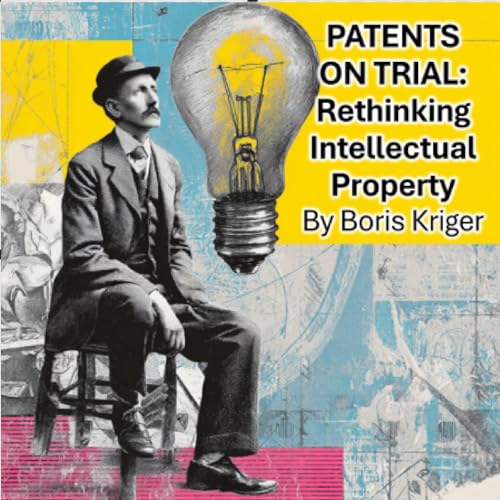
Patents on Trial
Rethinking Intellectual Property
Falha ao colocar no Carrinho.
Falha ao adicionar à Lista de Desejos.
Falha ao remover da Lista de Desejos
Falha ao adicionar à Biblioteca
Falha ao seguir podcast
Falha ao parar de seguir podcast
Assine e ganhe 30% de desconto neste título
Compre agora por R$ 38,99
-
Narrado por:
-
Chris Reynolds
-
De:
-
Boris Kriger
Sobre este título
For centuries, the patent has stood as a symbol of invention—a mark of genius, a reward for creativity, a promise that innovation would be protected and shared. But behind this polished image lies a more tangled reality. Patents today are wielded less as shields and more as weapons. They grant monopolies over life-saving drugs, obstruct progress in software and biotechnology, and often reward delay, secrecy, and litigation over actual discovery.
In this unflinching exploration, the author traces the journey of the patent system from its noble origins to its increasingly distorted present. With clarity and precision, the book uncovers how a structure designed to foster openness now encourages concealment, how it often confuses ownership with invention, and how the very act of filing can stall the future it claims to protect.
From stories of suppressed medicines and global patent wars to emerging questions around AI inventorship and the ethics of patenting life, this work draws a wide arc across law, technology, and society. It challenges the assumption that patents validate quality or serve justice, and it asks whether a different path—more transparent, more balanced, more humane—is still possible.
This is not a rejection of invention. It is a call to reclaim it.For centuries, the patent has stood as a symbol of invention—a mark of genius, a reward for creativity, a promise that innovation would be protected and shared. But behind this polished image lies a more tangled reality. Patents today are wielded less as shields and more as weapons. They grant monopolies over life-saving drugs, obstruct progress in software and biotechnology, and often reward delay, secrecy, and litigation over actual discovery.
In this unflinching exploration, the author traces the journey of the patent system from its noble origins to its increasingly distorted present. With clarity and precision, the book uncovers how a structure designed to foster openness now encourages concealment, how it often confuses ownership with invention, and how the very act of filing can stall the future it claims to protect.
From stories of suppressed medicines and global patent wars to emerging questions around AI inventorship and the ethics of patenting life, this work draws a wide arc across law, technology, and society. It challenges the assumption that patents validate quality or serve justice, and it asks whether a different path—more transparent, more balanced, more humane—is still possible.
This is not a rejection of invention. It is a call to reclaim it.


